- Home
- Julia London
The Revenge of Lord Eberlin
The Revenge of Lord Eberlin Read online
Returning to Hadley Green after fifteen years, the young Lord Eberlin has but one goal in mind: to avenge the death of his father. But when he is reunited with the beautiful target of his smoldering wrath, his plans take an unexpected turn.…
Tobin Scott has not been back to Hadley Green since Lily Boudine’s childhood testimony helped send his father to the gallows for stealing the valuable Ashwood jewels. Now a wealthy man, he intends to exact his revenge by destroying Ashwood and its lady. He offers Lily a choice between her life and the livelihoods of the people who depend on the estate. She chooses the former, certain she can hold his dangerous plans at bay.
Lily and Tobin’s game of one-upmanship quickly becomes a delicate dance of seduction, and she realizes he is not the cold, heartless man he tries to seem. In fact, she is certain he is right—his father was innocent. Together, they set out to find the jewels that will restore his family’s honor, and soon their unbridled passion uncovers a shocking secret that will change their lives forever.
“LONDON IS ONE OF THE VERY BEST.”
—Publishers Weekly
MEET THE AUTHORS, WATCH VIDEOS AND MORE AT
SimonandSchuster.com
THE SOURCE FOR READING GROUPS
Also visit Romance.SimonandSchuster.com
Critical acclaim for the vividly passionate novels of
Julia London
“London creates magic . . . and leaves her fans begging for more.”
—RT Book Reviews
“A triumph of wit and passion.”
—Booklist
“London’s characters come alive on every page and will steal your heart.”
—Atlanta Journal-Constitution
“Touching and terrific.”
—BookPage
“Laugh-out-loud funny and heartwarming.”
—Single Titles
“Complex and emotionally powerful.”
—The Romance Reader
“Truly exceptional.”
—Fresh Fiction
Also by Julia London
The Year of Living Scandalously
One Season of Sunshine
Summer of Two Wishes
A Courtesan’s Scandal
Highland Scandal
The Book of Scandal
The Dangers of Deceiving a Viscount
The Perils of Pursuing a Prince
The Hazards of Hunting a Duke
Guiding Light: Jonathan’s Story
Pocket Books
A Division of Simon & Schuster, Inc.
1230 Avenue of the Americas
New York, NY 10020
www.SimonandSchuster.com
This book is a work of fiction. Names, characters, places, and incidents either are products of the author’s imagination or are used fictitiously. Any resemblance to actual events or locales or persons, living or dead, is entirely coincidental.
Copyright © 2012 by Dinah Dinwiddie
All rights reserved, including the right to reproduce this book or portions thereof in any form whatsoever. For information address Pocket Books Subsidiary Rights Department, 1230 Avenue of the Americas, New York, NY 10020
First Pocket Books paperback edition March 2012
POCKET and colophon are registered trademarks of Simon & Schuster, Inc.
The Simon & Schuster Speakers Bureau can bring authors to your live event. For more information or to book an event contact the Simon & Schuster Speakers Bureau at 1-866-248-3049 or visit our website at www.simonspeakers.com.
Designed by Julie Schroeder
10 9 8 7 6 5 4 3 2 1
ISBN 978-1-4391-7546-0
ISBN 978-1-4391-7550-7 (eBook)
Thank you for purchasing this Pocket Books eBook.
Sign up for our newsletter and receive special offers, access to bonus content, and info on the latest new releases and other great eBooks from Pocket Books and Simon & Schuster.
or visit us online to sign up at
eBookNews.SimonandSchuster.com
Contents
Chapter One
Chapter Two
Chapter Three
Chapter Four
Chapter Five
Chapter Six
Chapter Seven
Chapter Eight
Chapter Nine
Chapter Ten
Chapter Eleven
Chapter Twelve
Chapter Thirteen
Chapter Fourteen
Chapter Fifteen
Chapter Sixteen
Chapter Seventeen
Chapter Eighteen
Chapter Nineteen
Chapter Twenty
Chapter Twenty-One
Chapter Twenty-Two
Chapter Twenty-Three
Chapter Twenty-Four
Chapter Twenty-Five
Chapter Twenty-Six
Chapter Twenty-Seven
Chapter Twenty-Eight
Epilogue
'The Seduction of Lady X' Teaser
ONE
Summer 1808
Hadley Green, West Sussex
Count Eberlin left London like a man with the world firmly in his grasp. His town home was in the fashionable Mayfair district and his horse was a sturdy gray Arabian he’d had delivered from Spain. He wore a coat of the finest Belgian wool, a silk shirt and neckcloth made by a renowned Italian tailor, Scottish buckskins, and Hessian boots fashioned in soft French leather. Confident and wealthy, he sat his horse like a king commanding an army.
Five hours later, he crested the hill on the main road through West Sussex. The village of Hadley Green nestled prettily in the valley below, with her thatched roof cottages, vibrantly colorful gardens, and a High Street bustling with commerce. And, very clearly, a village green.
His chest tightened painfully. He suddenly felt clammy, his skin flushed and damp, and he was strangely light-headed. Fearing he would topple right off his horse, he reigned up hard.
He’d believed the memory of what had happened there to be dead to him, but now he struggled to catch his breath as he watched children play on the green where his father had been hanged for thievery fifteen years ago.
Count Eberlin—or Tobin Scott as he’d been known then, son of Joseph Scott, the wood-carver—hadn’t traveled this road since his father’s death. He’d forgotten the lay of it and had not expected to see the green like this. He certainly hadn’t expected such a visceral reaction. He could feel the crank of rusted and disintegrated feelings awakening, though he’d believed himself to be dead inside, incapable of any sort of passion, dark or light.
As he stared at the green he was amazed that his head and his heart could trick him so. He could almost see the scaffold, could nearly smell the mutton and ale that had been sold the morning his father was executed. It was as if the carts still lined the streets beside the gallows.
A child raced across the green into the arms of a man who lifted her up and swung her high overhead.
There had been children at his father’s execution, too, playing around the edges of the green. The adults had been the spectators, come early to drink their ale and eat their mutton. Only thirteen years old at the time, Tobin hadn’t known how absurdly festive an execution could be. When his father was led across the green, the crowd, warmed by their ale, had cheerfully shouted, “Thief, bloody thief!” before taking another swig from their tankards.
He thought he’d buried the image of his father standing on that scaffold with his gaze turned toward the heavens and resigned to his fate; buried it deep in the black mud inside him, from which nothing could grow. But he saw the image again this summer day with vivid clarity. He pulled at his neckcloth, seeking relief from his sudden breathlessness.
He wasn’t suppose
d to have seen his father hang, naturally, for who would subject a man’s son to such horror? But precisely because he’d been thirteen, he’d disguised himself and gone to see it. Nothing could have kept him from his father’s last moments on this earth—not his grieving mother, not his despondent younger siblings. Not the reverend, who’d sought in vain to assure him that Joseph Scott would receive his forgiveness and comfort in heaven. A boy standing on the cusp of manhood, impotent in his rage, Tobin had been propelled by a primal need to be there, to witness the injustice, to have it scored into his mind’s eye and into his soul so that he would never forget, never forgive.
But until this moment, he’d thought he was irrevocably numb to it.
He dismounted and crouched down, and concentrated on finding the breath that had been snatched from his lungs. He closed his eyes and tried desperately not to replay the events of that horrific day, or to envision his father twisting all over again …
Yet the images came at him hard and fast. The day had been bright, warm, and cloudless, much like this day. Tobin had stood on a horse trough so that he could see over the heads of the onlookers, his hat pulled low over his eyes. His heart had beat out of his chest as the clergyman had offered his father a last word. His father had declined, and Tobin had been furious with him. Furious! That was his moment to shout that he’d not stolen the countess’s jewels, that he’d been unjustly accused and convicted! It was the moment he should have condemned them all for their stupidity and prejudice! But his father had remained intolerably silent.
With the crowd jeering, the clergyman had recited the Lord’s Prayer while the hangman had covered his father’s face with a black hood, then fitted the noose around his neck. He’d helped his father, as if he’d been infirm, onto the block. And then he’d kicked the block out from under his feet at the same moment that two men had hauled his father up by his neck. His father had twisted at the end of that rope, his legs kicking madly, desperately seeking purchase and finding nothing there to save him.
Thankfully, Tobin had been spared the actual end of his father because he’d fainted, and when he’d come to, the crowds had dispersed and his father had been cut down. Tobin had found himself lying on the walk, his nose bloodied from his fall, collapsed under the weight of horrific grief.
The unconscionable crime that had been committed against his family had indelibly marked his soul. He’d lost all his innocence and hopefulness. He’d been made completely immovable, blind to common emotion, incapable of sentimental feelings. If someone were to open him up, they’d see nothing but black rot oozing inside of him.
The only emotion Tobin felt anymore was revenge. And it was the reason why he’d finally returned to Hadley Green.
Tobin mounted his horse and turned onto an old, rutted road that, if memory served, skirted the village and avoided the green. As he rode along the seldom-used road beneath gnarled tree limbs and past weedy undergrowth, he recalled how the trial and his father’s execution had ruined the Scott family. Tobin, his mother, his sister, Charity, and his brother, Ruben, had become pariahs. They were the offspring of the man who’d been was accused of stealing priceless jewels from the beloved, alluring countess of Ashwood—jewels that had never been recovered, of course, because Tobin’s father had not taken them and had not been able to say where they’d gone.
Joseph Scott was a good, honest man. He’d been a master wood-carver, and with his death, his family had been left with no income. They’d become wards of the church, living on the charity of the parishioners. A proud woman, Tobin’s mother had not been able to abide the censure of a society in which she’d once been a respected member. Nor could she abide charity. So she’d decided to move her family to London a few weeks after her husband’s death.
On the day they’d carried their bags to the center of town and awaited the London coach, the Ashwood coach, with its red plumes and gold scrolls, had rolled down High Street and come to a stop outside a cluster of shops. As the Scotts had watched, a liveried coachman had opened the door, and out hopped Miss Lily Boudine in a pale blue frock. Her black shoes were polished to a sheen, and her hair was held up with the sort of velvet ribbons that Charity had coveted through the window of Mrs. Langley’s Dress Shop. Lily Boudine had waited for the coachman to hand down a woman who Tobin knew to be her governess, then she eagerly took the woman’s hand, bouncing a little as she’d tugged her along, smiling and pointing at the confectioner’s shop.
His heart had beat painfully at the sight of the girl, fueled by his rage and hatred. She was the ward of the countess, the lone witness who’d claimed to see his father at Ashwood the night the jewels went missing. Liar. To think of all the days he’d spent in that girl’s company while his father had built a staircase at Ashwood so grand that people came from miles about to see it. Tobin had been his father’s assistant, but there were days when his father had sent him out with the girl with strict instructions for Tobin to occupy her. Lily was five years younger than he, younger than even Charity, and Tobin had chafed at being made to play games with her. But he’d done it, had been her playmate, her companion, her servant.
In return, she’d told the magistrate she’d seen his father riding away from Ashwood the night of the theft—in the dark, in the rain, but she was certain it was Joseph Scott because of the horse. The moment she’d uttered the words, there’d been no hope for his father.
And then Lily Boudine had come to the village for a sweetmeat while he and his family had waited for the public coach that would take them from the only home they’d ever known.
She’d lived in luxury while his family had lived in two rooms near the notorious crime-ridden area of St. Giles. His mother had taken in sewing, squinting through the smoky haze of burning peat to see her tiny stitches. It was a mean existence for a family that had once enjoyed a good standard of living, and the change in their circumstance had soon taken its toll. Tobin’s young brother Ruben had died their first spring in London, when the filth of the rookery had spread through the streets in the form of a wasting fever. His mother had followed soon after.
Tobin was just fourteen and his sister eleven when their mother had died. Even now, he could recall the panic he’d felt at what would become of them. The worry had made him ill; he’d been unable to keep what little food they’d had in his belly. “You cannot die!” Charity had shrieked as she’d clung to his arm. “If you die, what will happen to me, Tobin? If you die, I shall die, too!”
Her frantic plea had given him the strength he’d needed to rise up, to press on. He’d thought of everyone in Hadley Green, warm in their beds with enough food to eat, with fuel for their hearths and candles to light their way, and he’d decided then that one day, he would avenge his family.
With only a few coins to his name, Tobin had taken Charity to a dress shop and bought her a good, serviceable gown. He’d then taken her to church. The rector, a wizened old man with tufts of silver hair in his ears, had squeezed Tobin’s shoulder with his liver-spotted hand. “We’ll find a place for her as a chambermaid, have no doubt,” he’d said. “The Ladies Beneficent Society is quite taken with orphans.”
Tobin hadn’t known what that meant, precisely, and his fists had curled as the vicar led Charity away. She’d looked over her shoulder at him, her eyes wide with fear. He’d promised his sister he would return for her as soon as he could, but that day, standing in the narthex, he’d had no idea how or when he would come for her.
As thin as a beanstalk, as dumb as a blade of grass, he’d risen up and pressed on, striking out on his own and surviving by sheer luck.
Naturally, he’d made his way to the docks, for what would a boy with no prospects do but dream of a different life in a different land? He’d had his size—tall with broad shoulders—and the fact that he could read and write and figure sums to recommend him. He’d planned to hire onto one of the three-masted merchant ships, but he’d been robbed and beaten almost senseless by some sailors who’d spotted an easy target. He’d come
to when someone had hauled him up by the scruff of his collar, and a florid, fleshy face had danced before him. Tobin had swung out, connecting with nothing, and the man had chuckled. He’d examined Tobin with small, dark eyes. “Calm yourself, lad. You’ve been soundly beaten, but not by me.”
That had been painfully obvious to Tobin. His hat was gone, his jaw ached, and his pockets turned inside out.
“Can you cook?” the man had asked.
“No,” Tobin had said, his voice breaking.
“Say aye.”
Tobin had been confused. Why would he say aye when it wasn’t true?
“Come now, say aye,” the man had said again, giving Tobin a good shake.
“Aye,” Tobin had said, bewildered.
“Very good. You’ll be my helper in exchange for a berth and food and five pounds at the end of the voyage.”
Only then had Tobin realized he was in a ship’s galley.
“Ethan Bolger’s me name,” the man had said. “I’m the cook on this ship. Most calls me Bolge. And what be your name, young man?”
“Tobin. Tobin Scott.”
“Ah, Scottie, you’ll make a fine apprentice, you will,” Bolge had declared as he’d dropped Tobin to the floor. “You can start with chopping the carrots.”
That was how Tobin had begun his life at sea. For two years he’d sailed the seas with Ethan Bolger, chopping carrots and stirring big vats of ship’s stew. For two years, he’d stood by the tables of officers and poured their wine, absorbing everything he could about the English merchant trade.
He’d seen dozens of ports. He’d walked through crowded markets, past snake charmers and silk merchants, spice traders and hashish pipes. He’d seen people unlike any he’d ever seen before, people whose skin was as black as night, whose eyes were round or angled, who dressed in clothing as colorful as rainbows, and spoke in languages that had sometimes sounded lyrical and other times harsh.

 A Royal Kiss & Tell
A Royal Kiss & Tell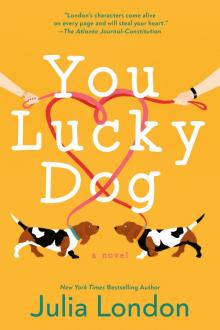 You Lucky Dog
You Lucky Dog The Devil in the Saddle
The Devil in the Saddle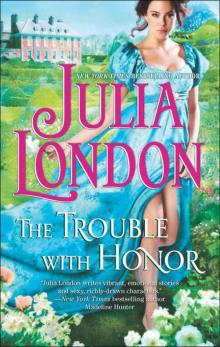 The Trouble with Honor
The Trouble with Honor Tempting the Laird
Tempting the Laird The Secret Lover
The Secret Lover A Light at Winter’s End
A Light at Winter’s End The Charmer in Chaps
The Charmer in Chaps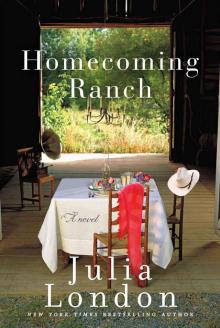 Homecoming Ranch
Homecoming Ranch Jack (7 Brides for 7 Soldiers Book 5)
Jack (7 Brides for 7 Soldiers Book 5)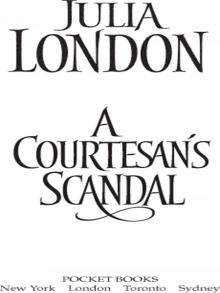 A Courtesan's Scandal
A Courtesan's Scandal Hard-Hearted Highlander--A Historical Romance Novel
Hard-Hearted Highlander--A Historical Romance Novel The Complete Novels of the Lear Sister Trilogy
The Complete Novels of the Lear Sister Trilogy The Last Debutante
The Last Debutante Suddenly Single (A Lake Haven Novel Book 4)
Suddenly Single (A Lake Haven Novel Book 4) Seduced by a Scot
Seduced by a Scot Highlander Unbound
Highlander Unbound Suddenly Dating (A Lake Haven Novel Book 2)
Suddenly Dating (A Lake Haven Novel Book 2) The Bridesmaid
The Bridesmaid The Seduction of Lady X
The Seduction of Lady X One Mad Night
One Mad Night Extreme Bachelor
Extreme Bachelor The Scoundrel and the Debutante
The Scoundrel and the Debutante The Revenge of Lord Eberlin
The Revenge of Lord Eberlin American Diva
American Diva The Lovers: A Ghost Story
The Lovers: A Ghost Story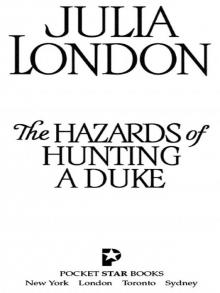 The Hazards of Hunting a Duke
The Hazards of Hunting a Duke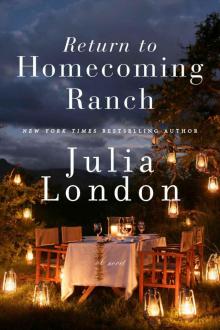 Return to Homecoming Ranch (Pine River)
Return to Homecoming Ranch (Pine River)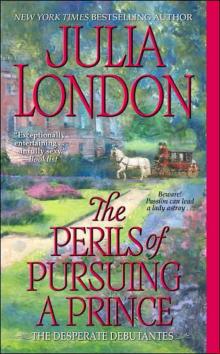 The Perils of Pursuing a Prince
The Perils of Pursuing a Prince Highlander in Love
Highlander in Love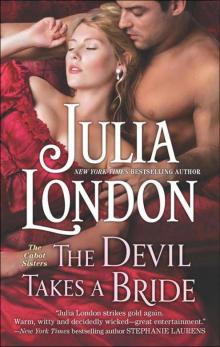 The Devil Takes a Bride
The Devil Takes a Bride Devil in Tartan
Devil in Tartan Wild Wicked Scot
Wild Wicked Scot Snowy Night with a Highlander
Snowy Night with a Highlander One Season of Sunshine
One Season of Sunshine Summer of Two Wishes
Summer of Two Wishes All I Need Is You aka Wedding Survivor
All I Need Is You aka Wedding Survivor Sinful Scottish Laird--A Historical Romance Novel
Sinful Scottish Laird--A Historical Romance Novel Suddenly Engaged (A Lake Haven Novel Book 3)
Suddenly Engaged (A Lake Haven Novel Book 3)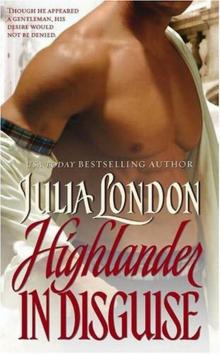 Highlander in Disguise
Highlander in Disguise Suddenly in Love (Lake Haven#1)
Suddenly in Love (Lake Haven#1)